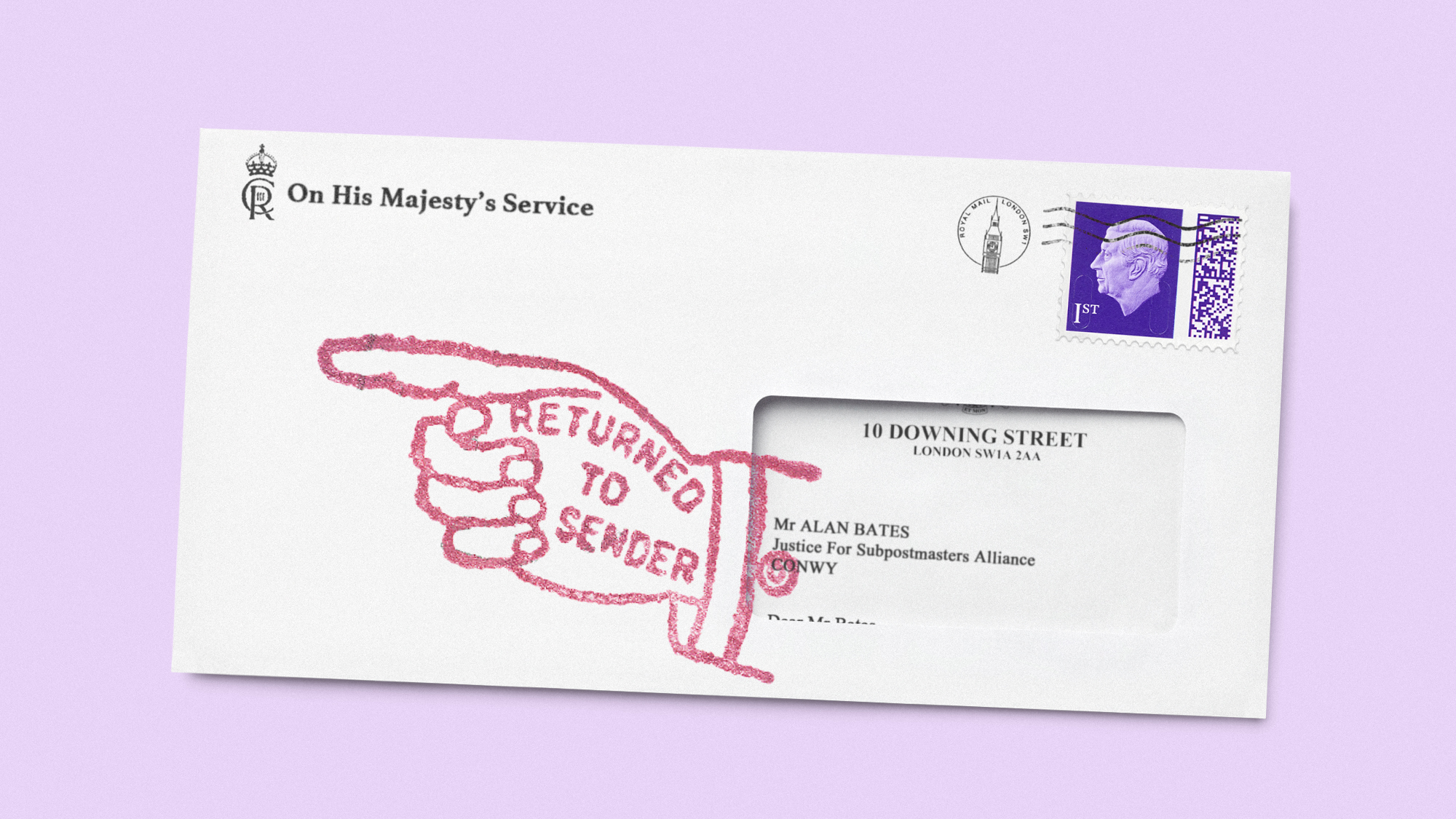Post Office scandal: should Alan Bates turn down 'tainted' knighthood?
Downing Street says it would be 'common sense' to honour former subpostmaster who led fight for justice

A free daily email with the biggest news stories of the day – and the best features from TheWeek.com
You are now subscribed
Your newsletter sign-up was successful
A former subpostmaster who spent decades fighting for justice for colleagues devastated by the Post Office scandal is being urged to refuse a knighthood.
Alan Bates led a 20-year campaign on behalf of Post Office workers, after more than 700 subpostmasters and mistresses were prosecuted and convicted of theft or fraud based on information from faulty Horizon software.
His story has recently become well known following the release earlier this month of ITV drama "Mr Bates vs. The Post Office".
The Week
Escape your echo chamber. Get the facts behind the news, plus analysis from multiple perspectives.

Sign up for The Week's Free Newsletters
From our morning news briefing to a weekly Good News Newsletter, get the best of The Week delivered directly to your inbox.
From our morning news briefing to a weekly Good News Newsletter, get the best of The Week delivered directly to your inbox.
Honour for Bates 'common sense'
Bates initially refused to accept an OBE while former Post Office boss Paula Vennells held a CBE given to her in 2019. He argued that accepting the honour would be a "slap in the face" to the victims, many of whom were not only prosecuted but faced financial ruin, lost their homes, or were shunned by their local communities.
But after Vennells relinquished her honour last week amid huge public pressure, Bates told The Times: "I would wait until I was offered, if anyone chooses to offer me one, then come back and ask me."
And the offer could come "sooner than expected", according to the paper. After a mass quashing of convictions was announced last week by the government, Downing Street said it would be "common sense" to honour Bates.
More than 125,000 people have signed a petition, led by the Daily Mirror, demanding that he be honoured with a CBE or even a knighthood for his role in exposing the Horizon scandal.
A free daily email with the biggest news stories of the day – and the best features from TheWeek.com
Labour has also backed the calls, with a spokesperson for Keir Starmer telling the paper that Bates has "clearly emerged as a hero" for his role leading the campaign.
"Obviously, honours have their own independent process, but I'm sure that is something the public would regard as entirely appropriate and we would support," the spokesperson said.
'British heroes receiving crumbs from a tainted table'
"Please don't accept it, Mr Bates," pleaded Matthew Syed in The Sunday Times. "Just say no."
If members of the honours committee "come knocking" with a CBE or even a knighthood, Syed continued, tell them to "shove it". After all, "it is the honours system, and the wider cancer of patronage and privilege, that provides the essential backdrop to this very British scandal".
What "shines through" in the ITV drama is that this scandal is "what happens when you have one set of rules for insiders – the ministers, the quangocracy, the executives of giant corporations – and a different set of rules for those who are euphemistically called 'ordinary people'".
Bates represents the "antithesis of the complacency" of the so-called establishment, argued Syed. He is "a counterpoint to the spider's web of access and impunity that distorts so much of our society", which is "why a knighthood would jar with those of us who see this scandal not merely as spotlighting a grievous injustice but as a chance to cut out this cancer once and for all".
Many defenders of the UK system of honours argue that it is valuable "because of the hundreds of unsung heroes and heroines who receive recognition", said Sky News's Adam Boulton. But the truth is that these unsung heroes "tend to get the lower honours" while the top awards, such as CBEs and peerages, "go to the already powerful". Britain's heroes are therefore "receiving crumbs from a tainted table".
Bates "deserves all the respect and praise we can give him", not least for his "decency and his honourable determination to clear the name of so many and obtain compensation for them". But "my advice to the people's hero, however, is do not 'Arise Sir Alan'".
Sorcha Bradley is a writer at The Week and a regular on “The Week Unwrapped” podcast. She worked at The Week magazine for a year and a half before taking up her current role with the digital team, where she mostly covers UK current affairs and politics. Before joining The Week, Sorcha worked at slow-news start-up Tortoise Media. She has also written for Sky News, The Sunday Times, the London Evening Standard and Grazia magazine, among other publications. She has a master’s in newspaper journalism from City, University of London, where she specialised in political journalism.
-
 The Olympic timekeepers keeping the Games on track
The Olympic timekeepers keeping the Games on trackUnder the Radar Swiss watchmaking giant Omega has been at the finish line of every Olympic Games for nearly 100 years
-
 Will increasing tensions with Iran boil over into war?
Will increasing tensions with Iran boil over into war?Today’s Big Question President Donald Trump has recently been threatening the country
-
 Corruption: The spy sheikh and the president
Corruption: The spy sheikh and the presidentFeature Trump is at the center of another scandal
-
 Delivery drivers face continuing heat risks with Trump's OSHA pick
Delivery drivers face continuing heat risks with Trump's OSHA pickThe Explainer David Keeling is a former executive at UPS and also worked at Amazon
-
 USPS Postmaster General DeJoy steps down
USPS Postmaster General DeJoy steps downSpeed Read Louis DeJoy faced ongoing pressure from the Trump administration as they continue to seek power over the postal system
-
 'The Postal Service has bound our nation together'
'The Postal Service has bound our nation together'Instant Opinion Opinion, comment and editorials of the day
-
 Trump reportedly wants to take over US Postal Service
Trump reportedly wants to take over US Postal ServiceSpeed Read President Trump is making plans to disband the leadership of USPS and absorb the agency into his administration
-
 Ukraine hints at end to 'hot war' with Russia in 2025
Ukraine hints at end to 'hot war' with Russia in 2025Talking Points Could the new year see an end to the worst European violence of the 21st Century?
-
 The future of X
The future of XTalking Point Trump's ascendancy is reviving the platform's coffers, whether or not a merger is on the cards
-
 The Democrats: time for wholesale reform?
The Democrats: time for wholesale reform?Talking Point In the 'wreckage' of the election, the party must decide how to rebuild
-
 What will Trump mean for the Middle East?
What will Trump mean for the Middle East?Talking Point President-elect's 'pro-Israel stance' could mask a more complex and unpredictable approach to the region